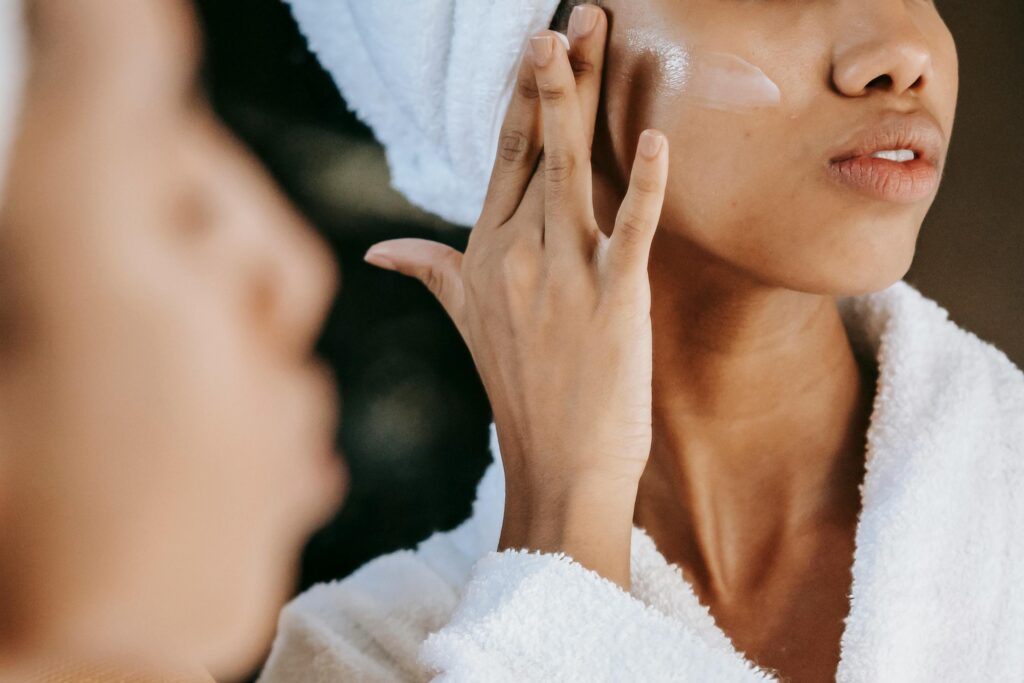The holy grail of anti-aging skincare isn’t as universal as you think.

Ah, retinol—the ultra-powerful skincare ingredient famous for combating wrinkles, texture, and uneven skin tone. Retinol can work wonders…
But don’t go slathering it on just yet. Because with big power comes big side effects.
What is Retinol?
Retinol is a form of Vitamin A that has a ton of skin-transforming benefits. It can stimulate collagen production, speed up cell turnover, and unclog pores, leaving you with a smooth, radiant complexion.
It’s important to know that most retinol formulas are synthetic, meaning they’re made in a lab with the use of chemicals.
Which can cause some ISSUES for those of us with dry, sensitive, or aging skin.
Here are five downsides to using traditional retinol:
1. Retinol Uglies
Picture this: you’ve just introduced retinol into your skincare routine, expecting to wake up to glowing, younger-looking skin. Instead, you’re greeted with severe redness, flakiness, and breakouts.
This condition is known as the “retinol uglies.” Because traditional retinol is harsh on your skin, the uncomfortable irritation it causes can last up to four months. Ouch.
2. Sensitivity to the Sun
Retinol and sunshine are like oil and water—they don’t mix. Because retinol is shedding the old, damaged cells from the top of your skin, newer, more delicate skin cells are closer to the surface.
And these young cells are far more vulnerable to the harmful effects of UV radiation. This makes your skin more susceptible to all forms of sun damage, including premature aging, which is exactly what we’re trying to prevent.
3. A Compromised Skin Barrier
Traditional retinol is a master exfoliator, which sounds like a good thing, right? But like anything, too much can spell trouble. Over-exfoliation can lead to redness, sensitivity, and a weakened or damaged skin barrier. When that happens, your outermost layer of skin can’t protect you from the sun or other environmental stressors.
4. Dryness, Dryness, Dryness
Prepare to say goodbye to plump, hydrated skin. Traditional retinol has a knack for disrupting the skin’s moisture barrier, leading to flaky patches that no amount of hydration can help.
5. Too Much Time
We’re all used to instant gratification, but retinol is here to remind us that not every refresh happens in an instant. Incorporating traditional retinol into your skincare routine requires a lot of time, patience, and perseverance. You have to figure out how much your skin can tolerate before becoming irritated.

Can Retinol Still Benefit People With Sensitive Skin?
Yes—it’s all about choosing the right one. Opting for a gentler formula is key to avoiding any unwanted side effects.
Which is why our Beauty Editors recommend…
This natural alternative to traditional retinols comes from sources like the Babchi plant, making it less harsh but still effective. It works well with any skin type and delivers maximum results with minimal environmental impact.
Choosing plant-based retinol is the ultimate act of self-care for both your skin and the planet. Our personal favorite is the Renew Daytime Retinol Serum from Ikaria Beauty. It’s so gentle, you can even use it during the day.
And if you don’t end up loving it, it’s no big deal! All of Ikaria Beauty’s products are covered by a Money-Back Guarantee, so you have the freedom to give it a try risk-free.
Keep your skin smooth, radiant, and safe.

Leave a Reply